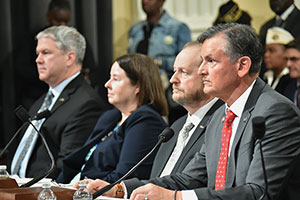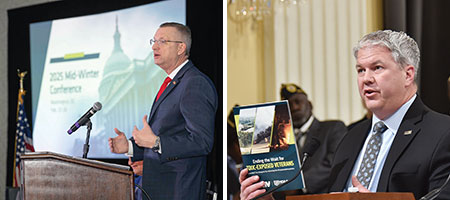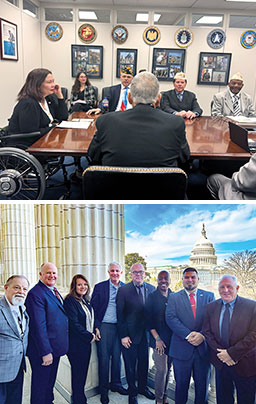
A cold Tuesday in February is common in Washington, D.C. A dramatic influx of messages from DAV members, supporters and citizens concerned about the safety and security of veterans benefits and other sensitive information is not.
That’s where things stood for DAV in the days and weeks after the new administration took office. A spate of executive orders and funding freezes, along with the creation of new executive offices amid employee layoffs at federal agencies, including the Department of Veterans Affairs, created an almost dizzying atmosphere where policymakers, advocates and media were left with more questions than answers.
But just as our nation’s veterans stepped up when their country called upon them, they also don’t sit idle when their benefits and livelihoods are threatened. That’s why hundreds of DAV’s most dedicated advocates descended on our nation’s capital at the end of February—to preserve and strengthen the benefits veterans have earned through their military service.
At the 2025 State Commanders and Adjutants Association Mid-Winter Conference, DAV and Auxiliary members held dozens of meetings in their elected officials’ offices focusing on the organization’s numerous legislative priorities and advocacy efforts—including preventing Congress from reducing, offsetting or taxing veterans benefits; strengthening policies for toxic-exposed veterans; and increasing caregiver support.
“One of our primary objectives here this week is to remind our elected officials of that solemn obligation they have in keeping the promise to America’s ill and injured veterans and their families,” National Commander Daniel Contreras told conference attendees. “With a new administration and new Congress, we start fresh, set new goals and embrace opportunities that create a better future for our veterans, their families, caregivers and survivors.”
Contreras pointed to DAV’s 100-plus years of legislative victories as evidence that the organization’s advocacy efforts play an integral role in helping ensure veterans of all generations—past, present and future—have a system accountable to them for illnesses and injuries sustained in service to the country.
“Building off the successes of our two most recent reports, Women Veterans: The Journey to Mental Wellness and Ending the Wait for Toxic-Exposed Veterans, our national legislative team looks to have an even greater impact on the lives of women veterans and veterans exposed to toxins during their military service,” Contreras said.
“The time to act is now,” he continued. “Our veterans have waited long enough, and their health and well-being depend on our collective commitment to implementing the changes we have recommended in these reports.”
National Adjutant Barry Jesinoski also spoke to the current challenges in Washington.
“In our case, we’re hearing voices with very radical ideas who, it seems, are eager to avoid paying the enduring cost of war. They want to reduce the deficit on the backs of the individuals and families whose sacrifices made our national prosperity possible,” he said. “This week is our opportunity to put a human face on the issues that will determine the future of veterans health care and benefits.”
VA Secretary Doug Collins also spoke at the conference’s opening session, marking his first address to a major veterans organization since assuming his role as the head of the department.
“Learning that he’s a veteran and served in Congress stood out to me,” said Marine veteran Phellep Snow, a member of Chapter 12 in Henderson, Nevada. “I hope [his time as a congressman] benefits him as secretary to get ideas into action and implement policies that will benefit veterans and their families. He certainly seems to understand the weight of his position.”

In Collins’ remarks, which served as an introduction to DAV and its members, he sought to quell concerns in the veteran community and spoke about his efforts to ensure department funding goes directly to benefits and care.
“It is not about the VA as an organization; it is about the veterans that we serve,” the secretary said before adding that veterans benefits and health care won’t be compromised under his leadership.
“We will hold him and the entire agency and all of Congress to that,” Jesinoski affirmed to the applause of over 450 attendees.
The conference culminated Feb. 25 when Contreras testified before a special joint session of the Senate and House Veterans’ Affairs Committees. Veterans and supporters packed the caucus room so tightly for the hearing that an overflow room had to be used in the Cannon House Office Building.
While the commander capitalized on the opportunity to highlight some of the organization’s pressing critical policy goals, the most powerful parts of his testimony came in sharing his personal experiences.
“When it comes to caregiving, for me it’s personal,” he said. “I know it’s an area that needs more focus because I live it as a veteran and a caregiver to my wife, who is battling stage 4 cancer.
“Like every caregiver I know, I’d do it all again in a heartbeat. And I know with every fiber of my being that if the shoe were on the other foot, she’d be there for me.”
In explaining how veterans need access to a full continuum of long-term care and caregiver support, Contreras called on Congress to “help veteran caregivers by providing comprehensive resources, including training and financial assistance, and requiring the VA to offer more assisted-living care options.”

In highlighting the organization’s own commitment to assisting caregivers, the commander touted the new DAV Caregivers Support program, which has connected over 1,400 unsung heroes to a host of public and private resources at no cost to them.
“While we are exceptionally proud of the success of this program, the responsibility to provide such support ultimately rests with the VA,” he reminded the committee.
He went on to tackle the importance of ensuring that toxic-exposed veterans are not left behind when it comes to recognizing presumptive conditions for their exposures, and he called on Congress to pass legislation that would expand research on toxic exposures, launch an independent scientific review process and establish a veteran advisory commission.
In closing his testimony, Contreras cited numerous proposals seeking to balance the federal budget on the backs of disabled veterans, including taxing VA disability compensation or phasing out certain unemployability benefits when a veteran reaches retirement age, reducing VA disability compensation levels for current and future veterans, and even ending lower disability payments altogether.
“We must ensure that the new administration’s promise of a ‘Golden Age for America’ strengthens how we care for our veterans,” Contreras implored. “But we’re seeing organized efforts to curtail what veterans have earned and deserve—a VA that is laser-focused on providing the best possible care and timely benefits to veterans, their families, caregivers and survivors.
“To follow through on this promise, veterans need Congress in their corner, just as they have been in ours.
“In this gilded era, we must ensure that veterans benefits are reinforced, not clawed back. The Department of Veterans Affairs needs to be fully funded and have predictable budgets. Veterans health care should be enhanced and streamlined, all while ensuring VA provides the right options to meet their evolving needs.
“Together, we have the chance to follow through on the social contract disabled veterans have earned. We hope you will join us in this fight. America is counting on it.”
The post Not on our backs appeared first on DAV.

